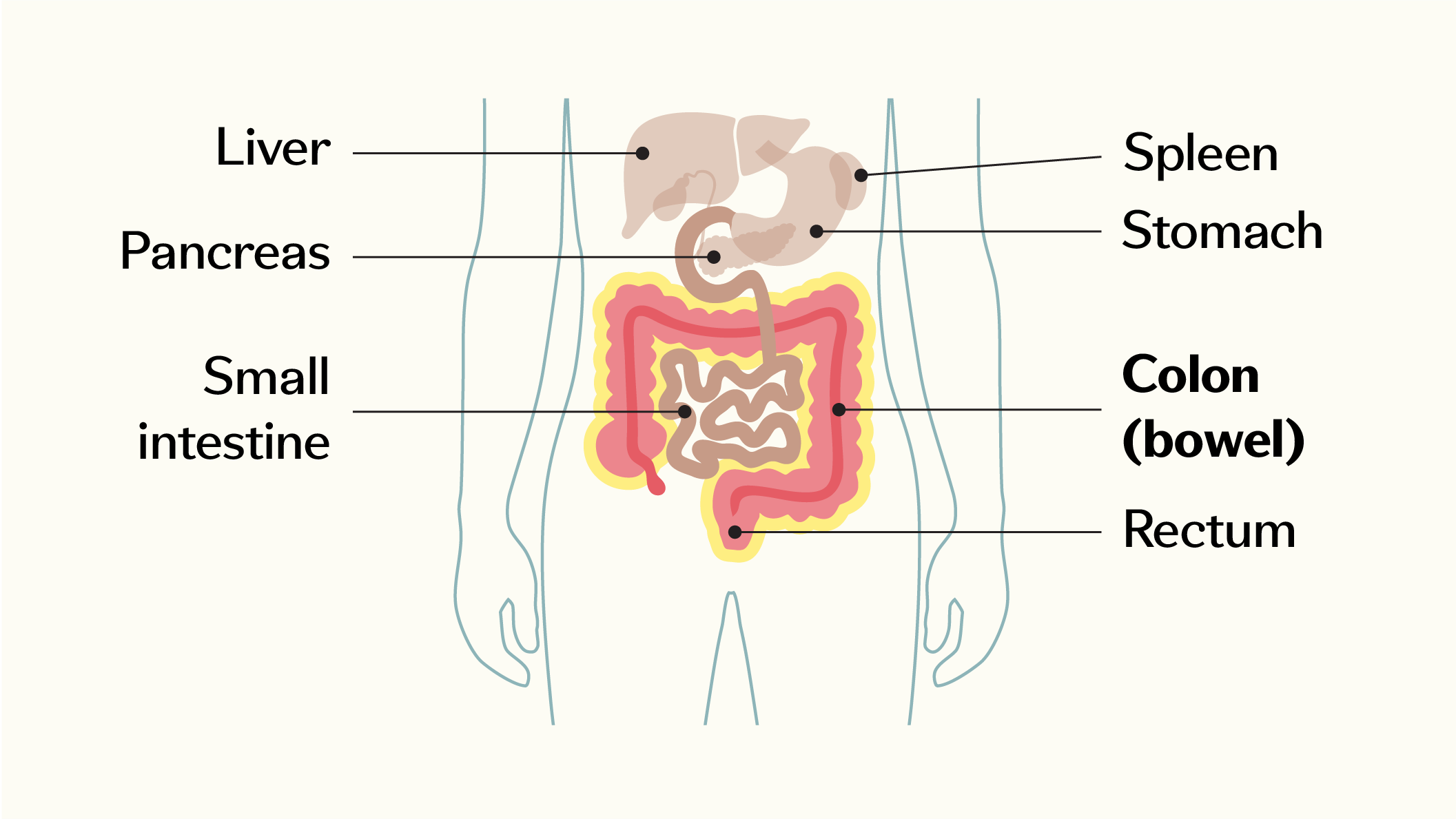The bowel
The bowel helps break down the food we eat and take in nutrients and water from it. It is split into the small bowel (also called the small intestine) and the large bowel (also called the large intestine). The large bowel is made up of the colon, rectum and anus.1

How bowel cancer starts
Bowel cancer starts when cells in the small bowel or large bowel begin to grow and divide uncontrollably.2 It usually starts with small, non-cancerous groups of cells that grow inside of the bowel. These are called polyps. Most polyps aren’t cancerous, but if not treated they can turn into cancer over time.3
Bowel cancer is the 4th most common type of cancer in the UK*. It is particularly common among people over the age of 50.2
While the exact cause of bowel cancer is not entirely known, things such as age, diet, lifestyle and a family history of bowel cancer may increase the risk.3
*Based on the average number of people diagnosed with bowel cancer in the UK each year between 2016 and 2018.
Types of bowel cancer
Different types of bowel cancer start in different types of cells in the bowel. Cells are the building blocks of every part of your body.4
This starts in gland cells in the wall of the bowel.3,4 Almost all bowel cancers worldwide are this type, with more than 95 in every 100 people (more than 95%) with bowel cancer having an adenocarcinoma.4,5
Starts in the skin cells that make up the inner lining of the bowel.4
Start in the cells of the bowel that produce hormones.4
A rare type of cancer that starts in tissues like muscles, bones, fat, nerves, or blood vessels.4
The lymphatic system runs throughout the whole body. It helps protect you from infection and keeps your fluid levels normal. Bowel lymphoma starts in lymphatic cells found in the bowel.4
A type of skin cancer that can start in the rectum (back passage).4
Treatment options for bowel cancer
Treatment is usually chosen based on the type of bowel cancer, what stage it is (how far it has grown within the bowel or if it has spread to another part of the body), and the person's general health.6
- Surgery: The main treatment for bowel cancer, surgery involves taking out the tumour and surrounding tissue. This is often the first step in treating large and small bowel cancer6,7
- Chemotherapy: This treatment uses anticancer drugs to kill cancer cells or stop them from growing. It can be used before and after surgery. It may also be used if the bowel cancer has spread to other parts of the body6,7
- Radiotherapy: Radiotherapy uses high-energy rays to target and destroy cancer cells. It may be used before surgery to make the tumours smaller, or after surgery to lower the chance of the cancer coming back. It may be used together with chemotherapy6,7
- Targeted therapy: These drugs target something specific in the cancer cells that help them to grow and survive. They can be used alone or with other treatments6
- Immunotherapy: This treatment helps your immune system to recognise and fight cancer cells8
No two diagnoses are the same, and treatment for bowel cancer will be tailored to your unique situation. It's important to speak openly with your healthcare team and to reach out for support whenever you need it. You are not alone in this journey.
Explore More on Bowel Cancer

If you or someone you know has been diagnosed with cancer, support groups and charities are great places to find information and connect with people going through a similar experience.

Life with cancer is different for everyone. So, if you need support, it should be personal to you. ByYourSide has been created by Pfizer to offer you practical support and guidance to help you manage life with cancer in a way that is best for you.
References
- Macmillan. The bowel. Available at: https://www.macmillan.org.uk/cancer-information-and-support/bowel-cancer/the-bowel [Accessed May 2025].
- Cancer Research UK. What is bowel cancer. Available at: https://www.cancerresearchuk.org/about-cancer/bowel-cancer/about-bowel-cancer [Accessed May 2025].
- Cancer Research UK. Risks and causes of bowel cancer. Available at: https://www.cancerresearchuk.org/about-cancer/bowel-cancer/risks-causes [Accessed May 2025].
- Cancer Research UK. Grades and types of bowel cancer. Available at: https://www.cancerresearchuk.org/about-cancer/bowel-cancer/stages-types-and-grades/grades-and-types [Accessed May 2025].
- Thrumurthy S G, Thrumurthy S S D, Gilbert C E, Ross P, Haji A. Colorectal adenocarcinoma: risks, prevention and diagnosis BMJ 2016; 354 :i359. [Accessed May 2025]
- Macmillan. Treatment for colon and rectal cancer. Available at: https://www.macmillan.org.uk/cancer-information-and-support/bowel-cancer/treatment-for-bowel-cancer [Accessed May 2025].
- Cancer Research UK. Treatment for small bowel cancer. Available at: https://www.cancerresearchuk.org/about-cancer/small-bowel-cancer/treatment [Accessed May 2025].
- Macmillan. Targeted therapies and immunotherapies for bowel cancer. [Accessed May 2025].



